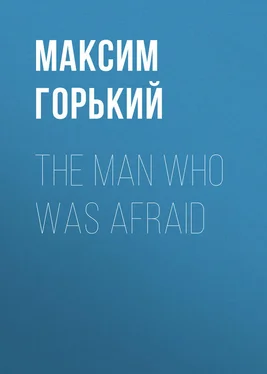Максим Горький - The Man Who Was Afraid
Здесь есть возможность читать онлайн «Максим Горький - The Man Who Was Afraid» — ознакомительный отрывок электронной книги совершенно бесплатно, а после прочтения отрывка купить полную версию. В некоторых случаях можно слушать аудио, скачать через торрент в формате fb2 и присутствует краткое содержание. Жанр: Русская классическая проза, Классическая проза, на английском языке. Описание произведения, (предисловие) а так же отзывы посетителей доступны на портале библиотеки ЛибКат.
- Название:The Man Who Was Afraid
- Автор:
- Жанр:
- Год:неизвестен
- ISBN:нет данных
- Рейтинг книги:5 / 5. Голосов: 1
-
Избранное:Добавить в избранное
- Отзывы:
-
Ваша оценка:
- 100
- 1
- 2
- 3
- 4
- 5
The Man Who Was Afraid: краткое содержание, описание и аннотация
Предлагаем к чтению аннотацию, описание, краткое содержание или предисловие (зависит от того, что написал сам автор книги «The Man Who Was Afraid»). Если вы не нашли необходимую информацию о книге — напишите в комментариях, мы постараемся отыскать её.
The Man Who Was Afraid — читать онлайн ознакомительный отрывок
Ниже представлен текст книги, разбитый по страницам. Система сохранения места последней прочитанной страницы, позволяет с удобством читать онлайн бесплатно книгу «The Man Who Was Afraid», без необходимости каждый раз заново искать на чём Вы остановились. Поставьте закладку, и сможете в любой момент перейти на страницу, на которой закончили чтение.
Интервал:
Закладка:
It happened one day that a degraded priest, a short, stout little bald-headed man in a torn cassock, chanced on Ignat, and stuck to him, just as a piece of mud will stick to a shoe. An impersonal, deformed and nasty creature, he played the part of a buffoon: they smeared his bald head with mustard, made him go upon all-fours, drink mixtures of different brandies and dance comical dances; he did all this in silence, an idiotic smile on his wrinkled face, and having done what he was told to do, he invariably said, outstretching his hand with his palm upward:
“Give me a rouble.”
They laughed at him and sometimes gave him twenty kopeiks, sometimes gave him nothing, but it sometimes happened that they threw him a ten-rouble bill and even more.
“You abominable fellow,” cried Ignat to him one day. “Say, who are you?”
The priest was frightened by the call, and bowing low to Ignat, was silent.
“Who? Speak!” roared Ignat.
“I am a man – to be abused,” answered the priest, and the company burst out laughing at his words.
“Are you a rascal?” asked Ignat, sternly.
“A rascal? Because of need and the weakness of my soul?”
“Come here!” Ignat called him. “Come and sit down by my side.”
Trembling with fear, the priest walked up to the intoxicated merchant with timid steps and remained standing opposite him.
“Sit down beside me!” said Ignat, taking the frightened priest by the hand and seating him next to himself. “You are a very near man to me. I am also a rascal! You, because of need; I, because of wantonness. I am a rascal because of grief! Understand?”
“I understand,” said the priest, softly. All the company were giggling.
“Do you know now what I am?”
“I do.”
“Well, say, ‘You are a rascal, Ignat!’”
The priest could not do it. He looked with terror at the huge figure of Ignat and shook his head negatively. The company’s laughter was now like the rattling of thunder. Ignat could not make the priest abuse him. Then he asked him:
“Shall I give you money?”
“Yes,” quickly answered the priest.
“And what do you need it for?”
He did not care to answer. Then Ignat seized him by the collar, and shook out of his dirty lips the following speech, which he spoke almost in a whisper, trembling with fear:
“I have a daughter sixteen years old in the seminary. I save for her, because when she comes out there won’t be anything with which to cover her nakedness.”
“Ah,” said Ignat, and let go the priest’s collar. Then he sat for a long time gloomy and lost in thought, and now and again stared at the priest. Suddenly his eyes began to laugh, and he said:
“Aren’t you a liar, drunkard?”
The priest silently made the sign of the cross and lowered his head on his breast.
“It is the truth!” said one of the company, confirming the priest’s words.
“True? Very well!” shouted Ignat, and, striking the table with his fist, he addressed himself to the priest:
“Eh, you! Sell me your daughter! How much will you take?”
The priest shook his head and shrank back.
“One thousand!”
The company giggled, seeing that the priest was shrinking as though cold water was being poured on him.
“Two!” roared Ignat, with flashing eyes.
“What’s the matter with you? How is it?” muttered the priest, stretching out both hands to Ignat.
“Three!”
“Ignat Matveyich!” cried the priest, in a thin, ringing voice. “For God’s sake! For Christ’s sake! Enough! I’ll sell her! For her own sake I’ll sell her!”
In his sickly, sharp voice was heard a threat to someone, and his eyes, unnoticed by anybody before, flashed like coals. But the intoxicated crowd only laughed at him foolishly.
“Silence!” cried Ignat, sternly, straightening himself to his full length and flashing his eyes.
“Don’t you understand, devils, what’s going on here? It’s enough to make one cry, while you giggle.”
He walked up to the priest, went down on his knees before him, and said to him firmly:
“Father now you see what a rascal I am. Well, spit into my face!”
Something ugly and ridiculous took place. The priest too, knelt before Ignat, and like a huge turtle, crept around near his feet, kissed his knees and muttered something, sobbing. Ignat bent over him, lifted him from the floor and cried to him, commanding and begging:
“Spit! Spit right into my shameless eyes!”
The company, stupefied for a moment by Ignat’s stern voice, laughed again so that the panes rattled in the tavern windows.
“I’ll give you a hundred roubles. Spit!”
And the priest crept over the floor and sobbed for fear, or for happiness, to hear that this man was begging him to do something degrading to himself.
Finally Ignat arose from the floor, kicked the priest, and, flinging at him a package of money, said morosely, with a smile:
“Rabble! Can a man repent before such people? Some are afraid to hear of repentance, others laugh at a sinner. I was about to unburden myself completely; the heart trembled. Let me, I thought. No, I didn’t think at all. Just so! Get out of here! And see that you never show yourself to me again. Do you hear?”
“Oh, a queer fellow!” said the crowd, somewhat moved.
Legends were composed about his drinking bouts in town; everybody censured him strictly, but no one ever declined his invitation to those drinking bouts. Thus he lived for weeks.
And unexpectedly he used to come home, not yet altogether freed from the odour of the kabaks, but already crestfallen and quiet. With humbly downcast eyes, in which shame was burning now, he silently listened to his wife’s reproaches, and, humble and meek as a lamb, went away to his room and locked himself in. For many hours in succession he knelt before the cross, lowering his head on his breast; his hands hung helplessly, his back was bent, and he was silent, as though he dared not pray. His wife used to come up to the door on tiptoe and listen. Deep sighs were heard from behind the door – like the breathing of a tired and sickly horse.
“God! You see,” whispered Ignat in a muffled voice, firmly pressing the palms of his hands to his broad breast.
During the days of repentance he drank nothing but water and ate only rye bread.
In the morning his wife placed at the door of his room a big bottle of water, about a pound and a half of bread, and salt. He opened the door, took in these victuals and locked himself in again. During this time he was not disturbed in any way; everybody tried to avoid him. A few days later he again appeared on the exchange, jested, laughed, made contracts to furnish corn as sharp-sighted as a bird of prey, a rare expert at anything concerning his affairs.
Читать дальшеИнтервал:
Закладка:
Похожие книги на «The Man Who Was Afraid»
Представляем Вашему вниманию похожие книги на «The Man Who Was Afraid» списком для выбора. Мы отобрали схожую по названию и смыслу литературу в надежде предоставить читателям больше вариантов отыскать новые, интересные, ещё непрочитанные произведения.
Обсуждение, отзывы о книге «The Man Who Was Afraid» и просто собственные мнения читателей. Оставьте ваши комментарии, напишите, что Вы думаете о произведении, его смысле или главных героях. Укажите что конкретно понравилось, а что нет, и почему Вы так считаете.












